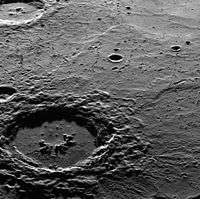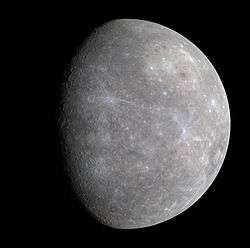Hokusai (crater)
|
Photo of Hokusai crater by MESSENGER | |
| Planet | Mercury |
|---|---|
| Coordinates | 58°18′N 342°18′W / 58.3°N 342.3°WCoordinates: 58°18′N 342°18′W / 58.3°N 342.3°W |
| Diameter | 95 km |
| Eponym | Katsushika Hokusai[1] |
Hokusai is a rayed impact crater on Mercury, which was discovered in 1991 by ground-based radar observations conducted at Goldstone Observatory.[2] The crater was initially known as feature B. Its appearance was so dissimilar to other impact craters that it was once thought to be a shield volcano. However improved radar images by the Arecibo Observatory obtained later in 2000–2005 clearly showed that feature B is an impact crater with an extensive ray system. The bright appearance of rays in the radio images indicates that the crater is geologically young; fresh impact ejecta has a rough surface, which leads to strong scattering of radio waves.[2]
Hokusai is named after Katsushika Hokusai (1760–1849), a Japanese artist and printmaker of the Edo period.[1] The name Hokusai was suggested by radar astronomer John K. Harmon.[3] The crater has a diameter of about 100 km; the rays extend for thousands kilometers, covering much of the northern hemisphere.[4]
References
- 1 2 "Ten Craters On Mercury Receive New Names". SpaceDaily. Retrieved March 29, 2010.
- 1 2 Harmon, John K.; Slade, Martin A.; Butler, Bryan J.; Head, James W.; Rice, Melissa S.; Campbell, Donald B. (2007). "Mercury: Radar images of the equatorial and midlatitude zones". Icarus. 187 (2): 374–405. Bibcode:2007Icar..187..374H. doi:10.1016/j.icarus.2006.09.026.
- ↑ "Hokusai Paints a Wave of Rays". NASA/Johns Hopkins University Applied Physics Laboratory/Carnegie Institution of Washington. 11 May 2010. Retrieved 13 May 2012.
- ↑ "PIA11356: Looking Back to the Source". NASA. October 6, 2008. Retrieved March 29, 2010.
| Wikimedia Commons has media related to Hokusai crater. |

